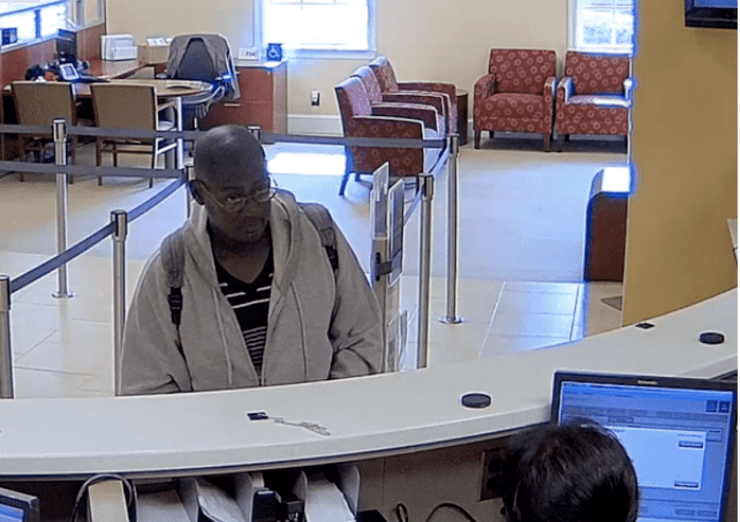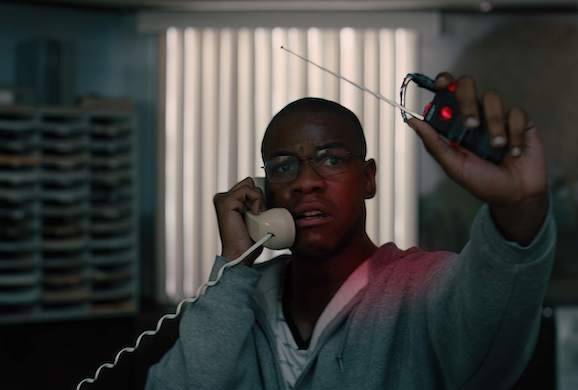When Brian Brown-Easley's monthly disability checks suddenly stopped in 2017, he made the desperate decision to hold up a bank to demand the money.
On July 7, 2017, a man walked into a Wells Fargo branch in Cobb County, Georgia, approached the teller, and claimed that he had a bomb — and that he was prepared to blow up the bank if he didn’t receive his money.
The man was 33-year-old Brian Brown-Easley, a former U.S. Marine who had struggled with mental illness since his deployments to Kuwait and Iraq. When his disability payments from Department of Veterans Affairs suddenly stopped, he “just snapped,” making the desperate decision to hold up the bank to demand the $892 he depended on for child support and rent.
Brown-Easley did not, in fact, have a bomb, and insisted in calls to authorities and reporters that he did not intend to harm anyone. Still, after a three-hour standoff, Brian Brown-Easley was shot in the head by a sniper. He died instantly.

Georgia Bureau of InvestigationBank surveillance footage of Brian Brown-Easley.
Some observers were quick to paint Brown-Easley’s story as a tale of a man who went mad and resorted to violence.
For others, however, it was a tragic example of what can happen when a country disregards the care of its veterans. The story caused such a stir that it was dramatized in the 2022 film Breaking, starring John Boyega as Brown-Easley.
This is the story of Brian Brown-Easley and how he ended up at that Wells Fargo that day.
The Early Life And Military Career Of Brian Brown-Easley
Born in 1983, Brian Brown-Easley was the youngest of eight siblings. His parents, Barbara Easley and Bobby Lee Brown, raised their children in a three-bedroom ranch house in Williamstown, New Jersey. Barbara deeply cared for all her children, but she especially doted on her baby, Brian, who had a shy, kind, and gentle nature.
Brian grew up playing Playstation with his brothers and had few friends outside of his home. After high school, he decided to join the U.S. Marines. For twelve weeks, he trained at Parris Island and transformed himself into a strong, determined soldier.
“I could not believe my eyes, how polished he was, how sharp, tall, strong,” Brian’s brother Calvin told Task & Purpose. “I sat there in awe the whole entire time. He went in a little boy, and they turned him into a man.”
Brian Brown-Easley eventually found himself at Camp Lejeune as part of the 2nd Marine Logistics Group. There, he made a small group of friends who gave him the moniker “Easy” after taking note of how easily he would apologize for the smallest inconvenience.
This small group of friends tightened their bond after being deployed to Kuwait together in 2003. Later, in 2005, Brown-Easley was deployed to Iraq.
There, he worked 17 hours a day in a physically demanding warehouse job for months at a time, resulting in chronic back issues that would plague him for the rest of his life. While he wasn’t on the frontlines, he worked in close proximity to battles between the U.S. and local insurgent groups. Often, mortar fire would send the warehouse workers running for the bunkers.
When Brown-Easley returned home later that year, he was not quite the same.
Brian Brown-Easley’s Tumultuous Return To Civilian Life
After an honorable discharge in 2005, Brian Brown-Easley returned home and moved in with his mother in Jefferson, Georgia. There, Easley met Jessica Tate, a Walmart cashier, and the two moved in together and got married.
From the outside, Brown-Easley’s transition back to civilian life seemed successful. He had a home, a wife, and a support system. But things were not as cheery as they seemed.
“We noticed a difference in him right away,” Brown-Easley’s brother Calvin recalled to Task & Purpose.
Brown-Easley began taking long walks by himself and flying into rages when his siblings teased him. No longer did he resemble the shy and apologetic man he had been. In a heartbreaking confession, Brown-Easley told his family that he was barred from reenlisting in the military because he had been diagnosed with PTSD, schizophrenia, and paranoia.
Then, in 2008, multiple things happened in Brown-Easley’s life at once. Jessica became pregnant and both of his parents fell ill, requiring him to spend most of his time in New Jersey taking care of them.
Eventually, his mental illness got so bad that Brown-Easley checked himself into a Veterans Affairs (VA) mental hospital and broke off contact with Jessica and his newborn daughter, Jayla. Brown-Easley would later explain to Jessica that it was for their safety. He believed people were after after him, and didn’t want to endanger his family.
Over the next few years, Brown-Easley bounced between staying with his brother Calvin in Georgia and another brother in New Jersey, attending filmmaking classes in Florida, and joining fringe religious groups.
Eventually, he moved to Marietta, Georgia and fostered a close relationship with his daughter, who was now eight years old. He began taking computer classes at a local for-profit college, and was helping to support Jayla using his monthly disability checks. He called his daughter every day and dreamed of being able to buy her a dog.
For a short period, it appeared that Brown-Easley was finding some normalcy. But that all changed after a series of frustrating run-ins with the VA.
Troubles With The Department Of Veterans Affairs
In the years following his honorable discharge, Brian Brown-Easley received monthly disability checks of $892 from the VA. These checks went towards child support and paying rent.
For Brown-Easley, these monthly payments were vital. So when his check didn’t arrive on July 1, 2017, he panicked.
“I’m just going to be out on the street tomorrow,” Brown-Easley later told WSBT-TV. “I have my hotel room tonight, and then tomorrow I have nothing. I’m just going to be out on the street, homeless, no food, no nothing.”
In the days after he noticed the check was missing, Brown-Easley frantically called the VA’s Veterans Crisis Line eight or nine times. The hotline was designed to provide suicide prevention and crisis intervention services for veterans 24-7, but allegedly, the VA staff hung op on him during several of these calls.
On July 3, Brown-Easley arrived at the VA’s Regional Benefits Office for an appointment to discuss the missing payment. There, a VA spokesperson told Task & Purpose, Brown-Easley appeared “extremely agitated and belligerent.” His behavior allegedly became so worrisome that staff placed him in handcuffs and waited for him to calm down.
“Once Easley calmed down,” the spokesperson said, “police removed the handcuffs and a VA benefits supervisor explained to him that his compensation check was recouped due to a debt he had created by his failure to complete college courses.”
The VA claimed it had sent him multiple letters informing him it planned to do this. But because Brown-Easley had moved around so often, it’s unlikely he ever received these letters.
He agreed to return to the VA office on July 6 for another appointment “and left the regional office voluntarily.”
But Brown-Easley never returned for his appointment. Instead, he concocted a desperate plan to hold a bank hostage to demand the money he felt was rightfully his.
A Struggling Veteran Takes Matters Into His Own Hands
On July 7, 2017, around 9:30 a.m., Brian Brown-Easley entered a Wells Fargo bank in Cobb County, Georgia and told the teller that the backpack he had slung over his shoulder contained explosives.

Bleecker Street MediaJohn Boyega plays Brian Brown-Easley in the 2022 film Breaking.
Brown-Easley allowed everyone but two bank employees to exit the building. From there, he demanded the hostages lock the doors and remain calm as he got on the phone with 911, a crisis negotiator, family members, and several news agencies.
Speaking to Stephanie Steiger of WSB-TV for nearly 40 minutes, Brown-Easley relayed his life story, from his military service, to his love for his daughter, to his current predicament. He explained that he didn’t want to hurt anyone, and didn’t even intend to rob the bank. He just wanted his $892 disability paycheck.
He even let the hostages speak to Steiger, and one of them told her Brown-Easley was “very respectful.”
“I already told [the hostages] if I detonate this bomb, I’ll let them go first,” Brown-Easley told Steiger. “These ladies are very nice, and they’ve been very helpful and supportive.”
Brown-Easley also exhibited signs of paranoia on the phone call, stating that members of a secret society were following him and had tried kidnapping him on four occasions.
“I don’t know these people,” he said to Steiger. “They seem to be able to track me wherever I go. They have my information.”
Throughout his phone calls, Brown-Easley would sometimes stop to cry, holding his head in his hands and muttering to whomever was on the line: “I just snapped.”
The Tragic Death Of Brian Brown-Easley

Google Street ViewThe Wells Fargo branch where Brian Brown-Easley was killed. It has since been replaced by a Chipotle.
As Brown-Easley spoke on the phone, police and SWAT teams were starting to gather outside the bank. It wasn’t long before the thought of law enforcement crossed his mind.
“I don’t know if they have snipers set up, or I don’t know what’s going on. I don’t know if they have SWAT out here, I can’t see that well,” he said to Steiger.
Eventually, Brown-Easley seemed to sense that the conflict was nearing an end. In an eerie prediction to Steiger over the phone, Brown-Easley said:
“Well, I probably won’t see my daughter again.”
And he was right.
After ending his call with Steiger, Easley spoke over the phone with conflict negotiators, finally agreeing to release one of the hostages in exchange for a pack of cigarettes. SWAT officers were optimistic they could resolve the crisis.
But after a three-hour standoff, despite hearing over the SWAT team’s radio that negotiations were being made, and despite an order from the assistant SWAT commander not to shoot “at this time,” Dennis Ponte, a member of the tactical team, took matters into his own hands.
“There was no effort or energy being put forth toward releasing somebody,” Ponte would later say, according to Task & Purpose.
He shot Brown-Easley in the head, killing him instantly.
The Impact Of Brian Brown-Easley’s Story
The news of Brown-Easley’s death, and the events leading up to it, shocked the community. For some, Brown-Easley’s final act was one of violence. After all, he had threatened to blow up a bank, holding innocent people hostage.
For others, Brian Brown-Easley’s story painted a deeply disturbing picture of how veterans are treated in the United States: Struggling with mental illness, receiving limited support from the VA, and with apparently nowhere to turn, Brown-Easley had been pushed to the edge.
“The problem was bigger than the Cobb County Police Department and Mr. Easley,” Sgt. Andre Bates, the lead negotiator during the conflict, told Task & Purpose. “The problem is the system — how they treat retired veterans. You should get more than ‘I appreciate your service.’ The VA owes these guys more.”
Those who knew Brian Brown-Easley insist he was not a violent person, but a man who had become desperate when it seemed he had run out of options.
“I’m livid,” Calvin told Task & Purpose. “He was a hero. He was not some psycho on the corner. He was not. He was a gentle giant until you pushed him. If you pushed him to the max, then you’d see a different person. But it took an awful lot. It took a lot.”
After reading about Brian Brown-Easley, discover the story of Chris Kyle, the real-life “American Sniper.” Then, dive into the story of the 1997 North Hollywood Shootout, one of the biggest gun battles in Los Angeles history.





